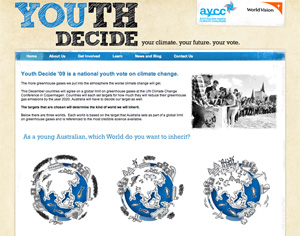
ALANA SMITH, national director of World Vision’s youth movement, Vision Generation, writes about a new bid to have the voice of Australian youth heard when it comes to climate change policies…
Like many young people, the beginning of Kevin Rudd’s prime ministership signalled to me the dawn of a new era in Australia, at least as far as social justice was concerned. I was in attendance at the Human Rights Council in Geneva, Switzerland when the Rudd Government said ‘sorry’ to Australia’s indigenous population, made some long and overdue changes relating to laws affecting refugees and asylum seekers and ratified the Kyoto Protocol. Never in my life had I felt so proud to introduce myself to those representing nations around me that I was from Australia- a country that was beginning to make some serious progress on fundamental social justice issues. These changes resonated deeply with young people who had become disillusioned and disengaged with the Australian Government and frustrated by their lack of leadership on human rights and the environment. It was certainly a turning point in Australia’s history.

VOICING THEIR CONCERN: World Vision’s Youth Decide website where people aged between 12 and 29 will be voting on the issue of climate change.
“Today’s young people are criticised for not being as politically active as young people were in the 1960s – we are stereotyped as being apathetic and selfish and are generally considered to be too involved in our own world to be engaged politically. However, it must be said that our apparent disinterest is connected to our frustration with the Government’s failure to take the voice of youth into consideration when developing policy around issues such as climate change.”
Close to 20 months later, we are at another turning point as the world gears up for the global negotiations on climate change in Copenhagen in December. These negotiations present an opportunity for the Australian Government to lead the way in a global action plan to tackle climate change. Whether the Australian Government will make the most of this opportunity is uncertain. There are, however, two certainties. The first is that if the Australian Government fails to take stronger action on climate change, they risk jeopardising a sustainable future for the world’s people in developed and developing countries. This urgency is highlighted by the UN Intergovernmental Panel on Climate Change which states that the minimum industrialised countries need to commit to is a 25 to 40 per cent reduction by 2020 over 1990 levels – and even that only gives us a 50/50 chance of avoiding a two degree temperature rise. The second certainty is that the voices of young people speaking out for stronger action on climate change is not been heard by the Australian Government.
Instead, much of the attention given to climate change has been in relation to the Government and Opposition’s squabbling over the Carbon Pollution Reduction Scheme (CPRS). Many politicians are speaking about the effect of climate change ‘on our children,’ but these words are not turning into actions. The term ‘our children’ refers to us, and all we are seeing is political point-scoring and bickering. This has been at the expense of the voice of many young people who have been passionately campaigning for stronger action on climate change.
Today’s young people are criticised for not being as politically active as young people were in the 1960s – we are stereotyped as being apathetic and selfish and are generally considered to be too involved in our own world to be engaged politically. However, it must be said that our apparent disinterest is connected to our frustration with the Government’s failure to take the voice of youth into consideration when developing policy around issues such as climate change. Despite the fact that our generation stands to be the most affected by climate change, our future is being decided by those who will not be around to witness the consequences of their action or inaction. The Government is making these decisions without listening to our concerns.
It has become clear that the planet and its people all over the world cannot rely on the Australian Government to take action on climate change. The existence of thousands of young people campaigning for climate change justice across the country demonstrates a widespread understanding about the need for sweeping, legislated changes in order to tackle climate change effectively. The fact that thousands of young people aged between 12 and 29 have registered to vote in Youth Decide ’09, Australia’s first youth run vote on climate change, is indicative of the growing movement of young people that are speaking out for a more secure climate future.
The results will send a strong message to the Australian Government about the sort of future that young people wish to inherit. So many people – especially young people – voted for Kevin Rudd in the last election because of his commitment to stronger action on climate change. Unless the Australian Government steps up, it would appear that this promise has been broken. As we draw closer to December’s climate change negotiations in Copenhagen and another Federal election next year, the young voice campaigning for stronger action on climate change has never been so loud. We will not stop speaking out until we are heard.
Alana Smith is the national director of World Vision’s youth movement Vision Generation. Voting on Youth Decide ’09 will take place until 21st September at www.youthdecide.com.au





